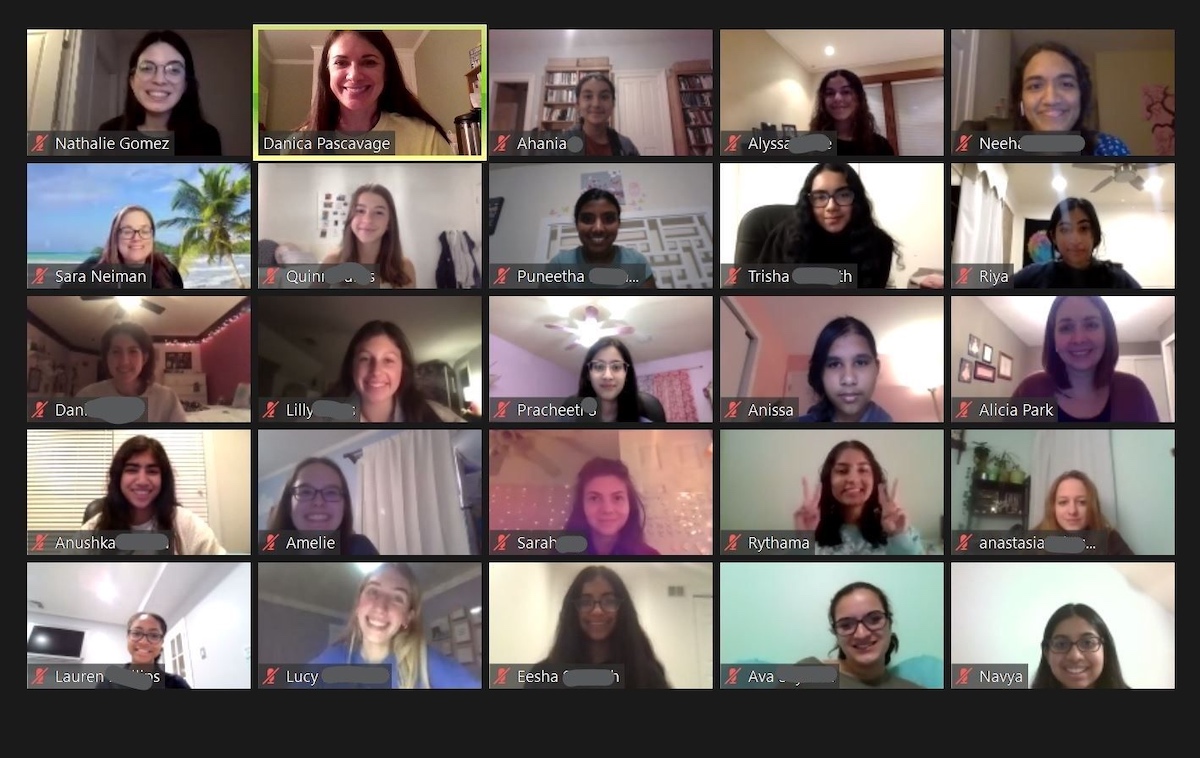As an organization built on delivering interactive tech workshops using volunteers, when the pandemic struck in 2020, TechGirlz faced a crisis.
How were they going to continue delivering the programming and community that girls were going to need more than ever? How, or even could they, transition in-person workshop plans to be presented in a virtual environment? How were they going to engage their volunteers to become remote instructors? Like any successful startup, the team faced this challenge head-on with one singular focus. They could not let down their “customers” — the girls and their adults — who had depended on them and now needed them to help provide some degree of normalcy in what was becoming a not at all normal world.
The TechGirlz “Pandemic Pivot” was born.
Like many organizations in those early days, what the team did not realize was what they were doing and learning as they made shifts and pivots was that every change, every decision would have a lasting impact on their business model moving forward.
From the forced changes, TechGirlz learned valuable lessons at an accelerated pace — the largest being the importance of incorporating a virtual component into their overall programming. The idea had on their radar for some time as a “when we get to it” item. The necessary pivot and resulting data and outcomes, including an increase in number, diversity and locations of girls participating in workshops and the overwhelming positive feedback from girls, parents, and volunteers about the virtual workshops, made them realize this change had to become a permanent part of TechGirlz programming. Future plans now include a fully hybrid model where volunteers can opt to run in-person or virtual workshops.
- Lesson learned: Keep revisiting those “when we get to it” ideas. You might want to implement them sooner than you think and definitely before you are forced to by circumstances beyond your control.
The TechGirlz team were not the only ones who developed resilience and learned lessons during the pandemic. The shifts they made spurred their colleagues at parent organization Creating IT Futures to also envision and launch some new programs, including a long-considered apprenticeship program with companies and the Department of Labor to provide new on-ramps to tech careers. The growth of TechGirlz and the new way of looking at their program delivery also prompted plans for a new middle school education program that will be launching in 2022 to provide opportunities for girls and boys to explore technology and the pathways to tech careers. These new ventures happened because the entire organization strengthened its commitment to open, regular communication with scheduled meetings to make sure everyone knew what was happening across the organization, to have check-ins on everyone’s state of mind, and to ensure that any and all ideas were able to be shared.
- Lesson learned: Embrace the wild ideas, even in the midst of chaos. When the ideas for some of these new programs were first suggested they were never dismissed as too big or unrealistic. What eventually was implemented may not be exactly what was originally presented, but that first big idea was a good starting point for what became an actionable and exciting new program.
2020 and 2021 were not easy years for anyone, individual, for-profit, or nonprofit. No one came out of them unscathed. Everyone had to develop some degree of resilience personally and professionally just to survive what we had previously considered the unthinkable. TechGirlz is fortunate that our organization not only survived but managed to also find new ways forward.
While we hope that it is not another global pandemic, the reality is that every organization will find times that it will struggle. Along with the lessons above, from our experiences, our advice is:
Build a culture of flexibility
In not only process, but in brainstorming and in idea generation and in the comfort to speak up whether you feel something is right or wrong.
Listen to your customers
They are always going to tell you what they need. They just may not tell you directly sometimes you have to do more than ask, you have to observe.
Data, data, data
Always follow the data, but also be willing to follow your gut — supported by the data.
Be comfortable in the uncomfortable
Your organization has to have an environment where your team feels safe being comfortable in the uncomfortable. That requires open, consistent, transparent communication. Your team members need to be informed. You have to have the processes in place for open communication where they can all express what they need to survive and be healthy during uncertainty and discomfort. It also requires learning which of your team members are comfortable sitting in the uncomfortable and ones who are not. Then creating an environment where those two groups know how to virtually and metaphorically hold hands and support one another through that discomfort.
Resilience and growth aren’t built through comfort. Resilience and growth are built in discomfort and adversity, but resilience is easier built when you have others to lean on.







